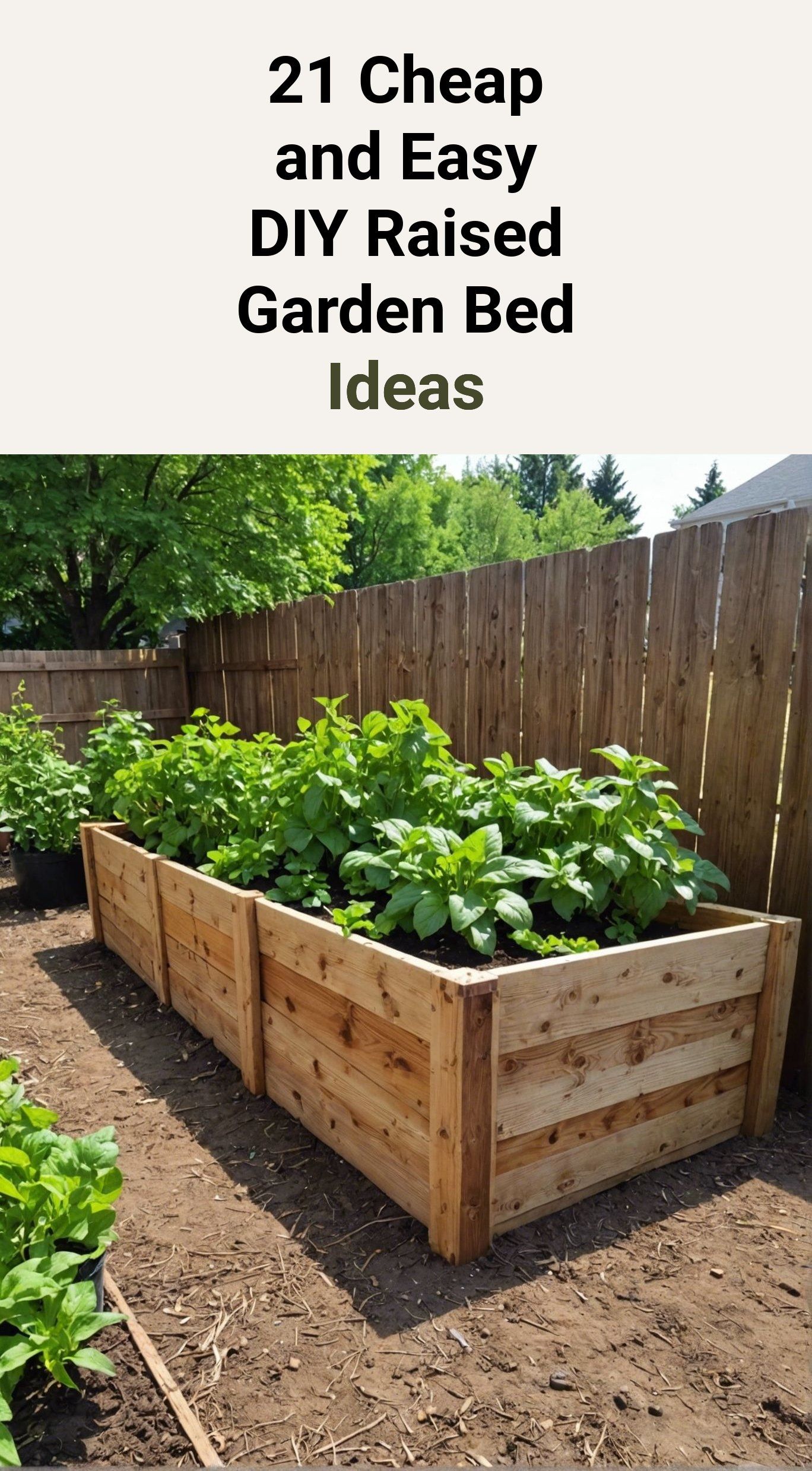Beautiful Plants For Your Interior
Beautiful Plants For Your Interior
Are you yearning to green up your space but tight on budget and time?
Look no further! In this article, I’ll share my secrets for creating stunning raised garden beds on the cheap and easy.
From repurposed pallets to innovative straw bales and everything in between, I’ve got 21 DIY ideas that will transform your gardening dreams into reality without breaking the bank.
Embark on this journey with me and let’s elevate your garden game!
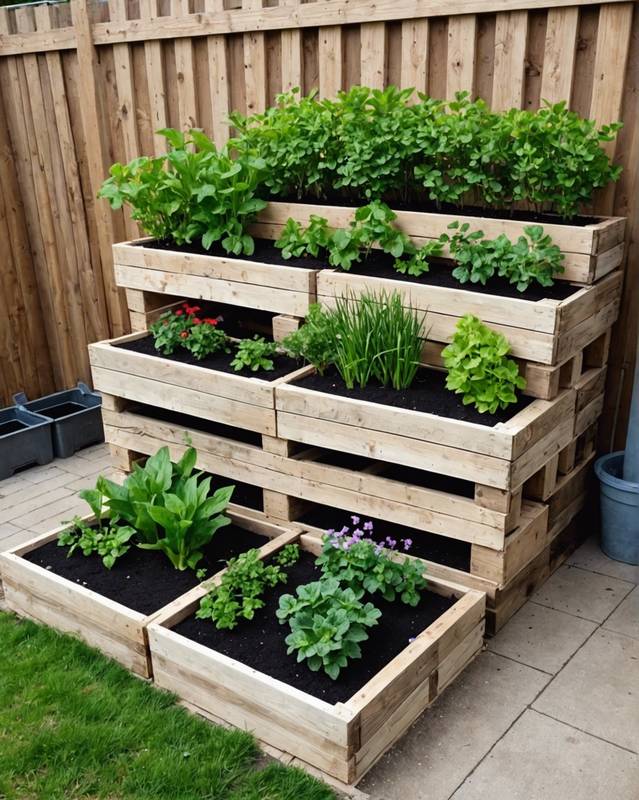
Pallet planters are one of the most convenient and cost-effective ways to create raised garden beds.
With their sturdy construction and versatility, they offer excellent drainage and allow for easy customization to meet the specific needs of any gardening enthusiast.
Pallet planters are made from recycled wood, making them an eco-friendly and sustainable option for gardening.
They can be assembled without the need for specialized tools or skills, allowing for quick and effortless setup.
The open slatted design of pallets promotes airflow and prevents waterlogging, creating an optimal environment for plant growth.
By utilizing the existing structure of pallets, gardeners can save both money and time compared to constructing traditional wooden raised beds from scratch.
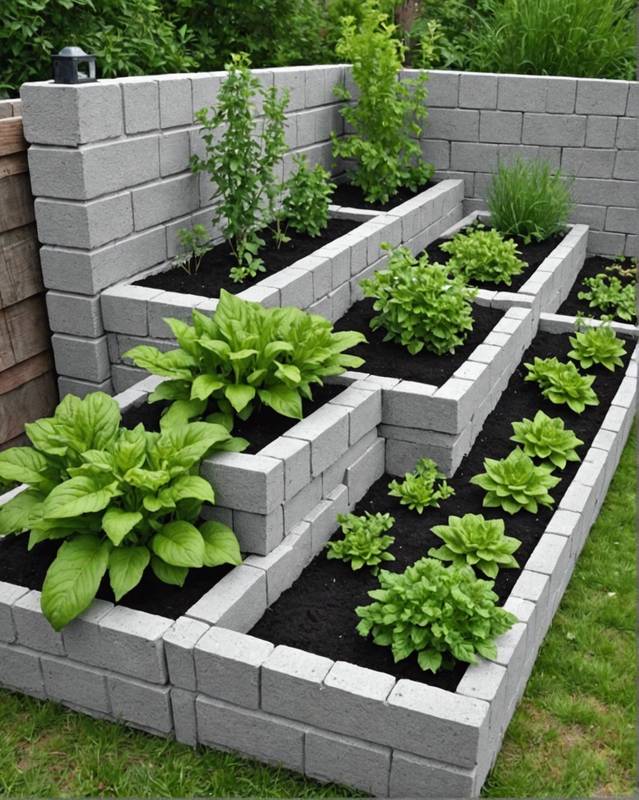
Sturdy and economical, cinder block raised garden beds are a popular choice for growing vegetables and flowers. The interlocking design of the blocks creates a strong and stable structure, while the hollow cores provide drainage and aeration for the soil.
Cinder blocks are readily available at most home improvement stores and can be easily stacked to create beds of any size or shape.
They are also a relatively inexpensive option compared to other raised bed materials, making them a budget-friendly choice for gardeners.
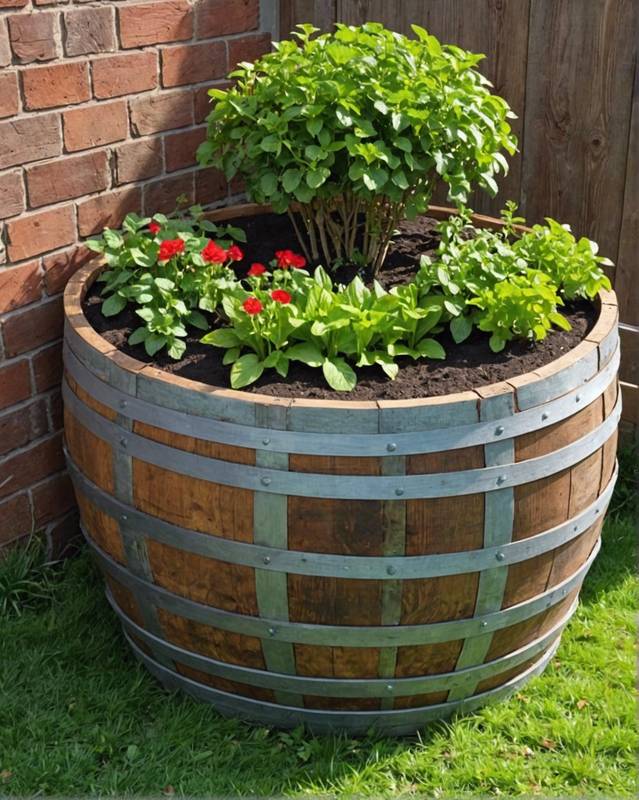
Transform an ordinary wine barrel into a rustic and charming planter. Cut the barrel in half lengthwise, creating two unique raised beds.
Line the barrels with plastic or landscaping fabric to prevent soil loss and water rot.
Fill the beds with rich soil and your favorite plants, creating a stunning focal point in any garden. Personalize your planter by painting it in bold colors or leaving it in its natural state.
Anchor the barrel halves securely to the ground or build a supporting frame for added stability.
Enjoy the beauty of your repurposed wine barrel planter while growing fresh herbs, vegetables, or flowers.
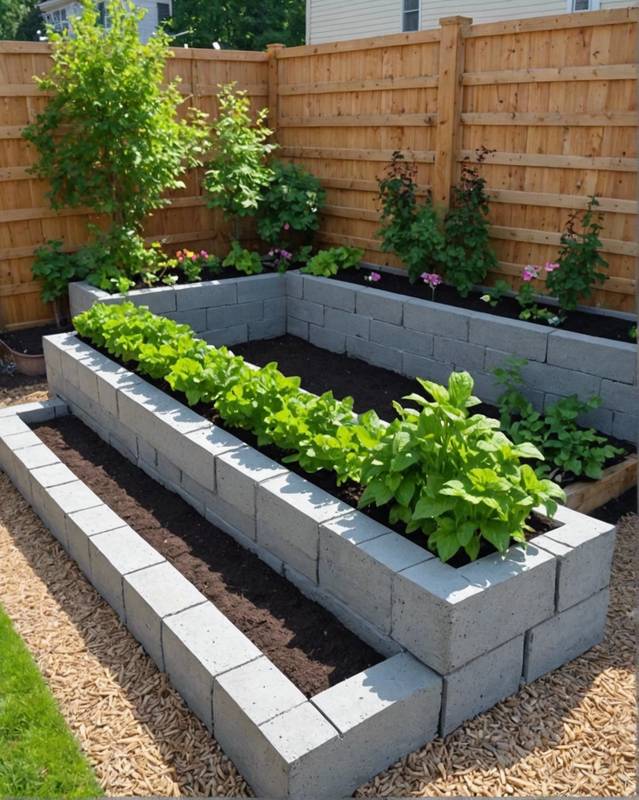
Concrete blocks are a durable and inexpensive option for raised garden beds. They can be stacked to create different heights and configurations, making them suitable for any size or shape of garden.
Concrete blocks are also easy to work with, making them a great choice for beginners.
To build a concrete block raised garden bed, simply stack the blocks to the desired height and width. Fill the bed with soil and plants, and you’re ready to go.
Concrete blocks are heavy, so it’s important to place them on a level surface.
You can also use stakes or rebar to reinforce the bed and prevent it from shifting.
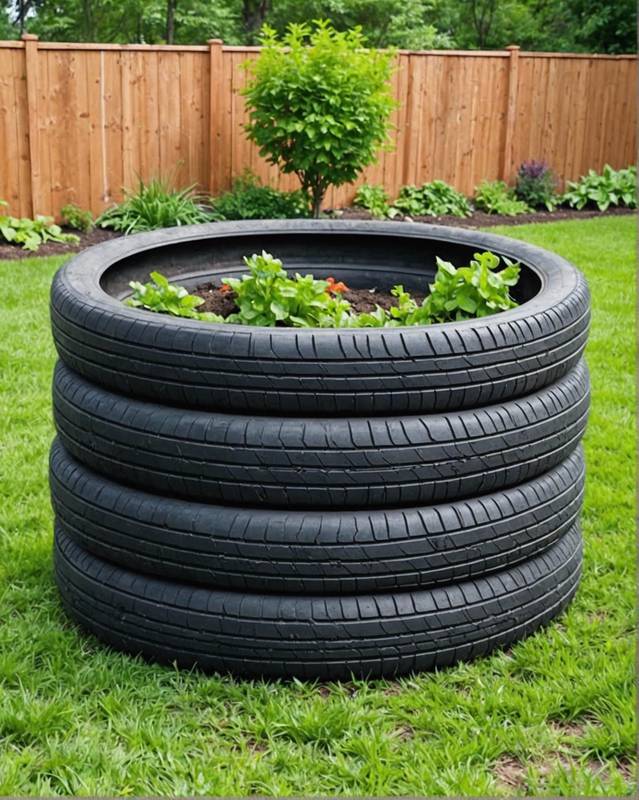
You can use old tires or tubes from bikes or cars to create unique and inexpensive raised garden beds. You can arrange them vertically to make tiered planters or lay them horizontally to form wider beds.
Since tires have good drainage, they are perfect for areas that tend to collect water.
Plus, you can paint them any color you like to create a personalized aesthetic in your garden.
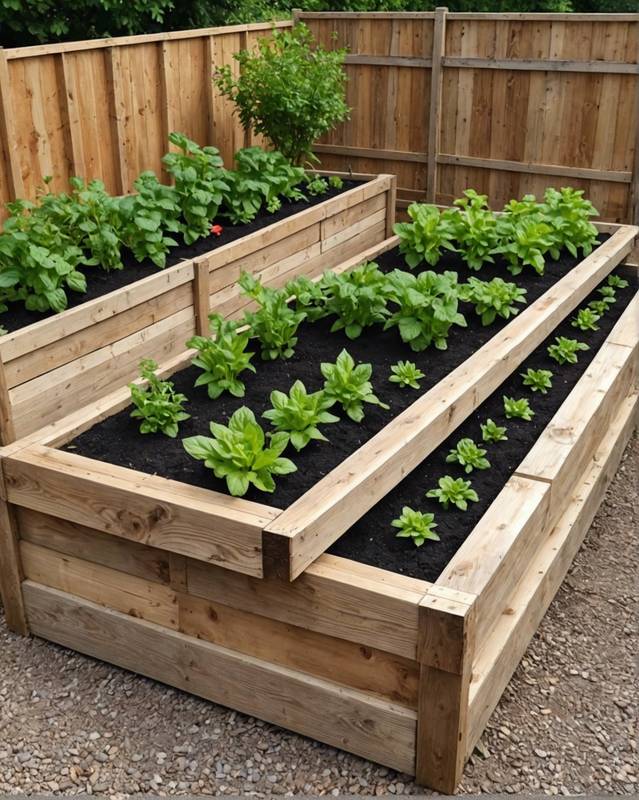
Upcycle discarded wood planks to create a rustic and environmentally friendly garden bed.
Salvaged wood provides a unique character and adds a touch of history to your outdoor space while reducing waste and promoting sustainability.
These repurposed planks not only create a sturdy and functional structure but also add warmth and visual interest to your garden.
With a little creativity, you can transform old wood into a beautiful and practical raised bed that will enhance the beauty and yield of your homegrown produce.
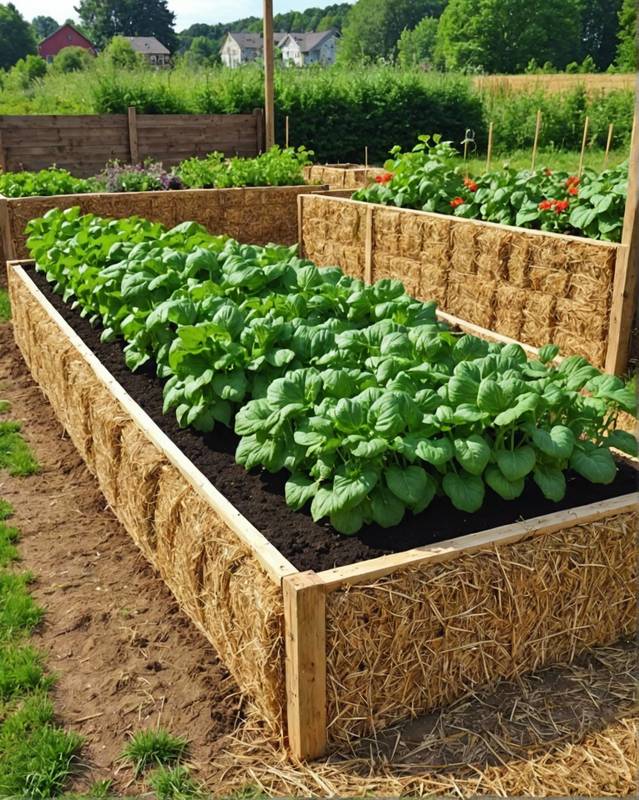
A straw bale garden is an innovative and budget-friendly solution for space-conscious gardeners. By utilizing stacked straw bales as raised beds, you can create instant growing spaces without the need for expensive materials or heavy construction.
Straw bale gardens are surprisingly durable, providing a sturdy foundation for various plants.
The decomposition process of the straw releases nutrients into the soil, enriching it and promoting healthy plant growth. Additionally, straw serves as an effective moisture retainer, reducing the frequency of watering.
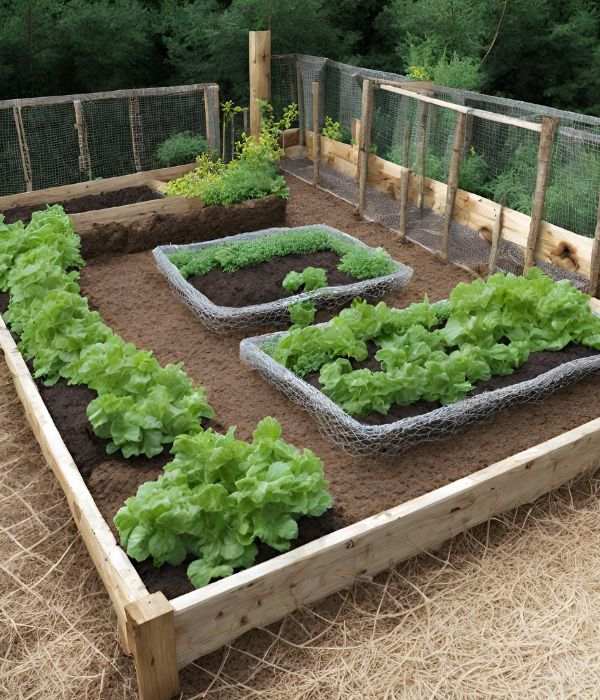
Chicken wire and stakes are a quick, cheap, and easy way to build a raised garden bed. This method is particularly useful for small gardens or irregularly shaped areas.
Chicken wire is a flexible material that can be easily shaped to fit any space.
Stakes are used to anchor the wire in place. This type of raised garden bed is not as permanent as other methods, but it is a great option for those who want a quick and easy solution.
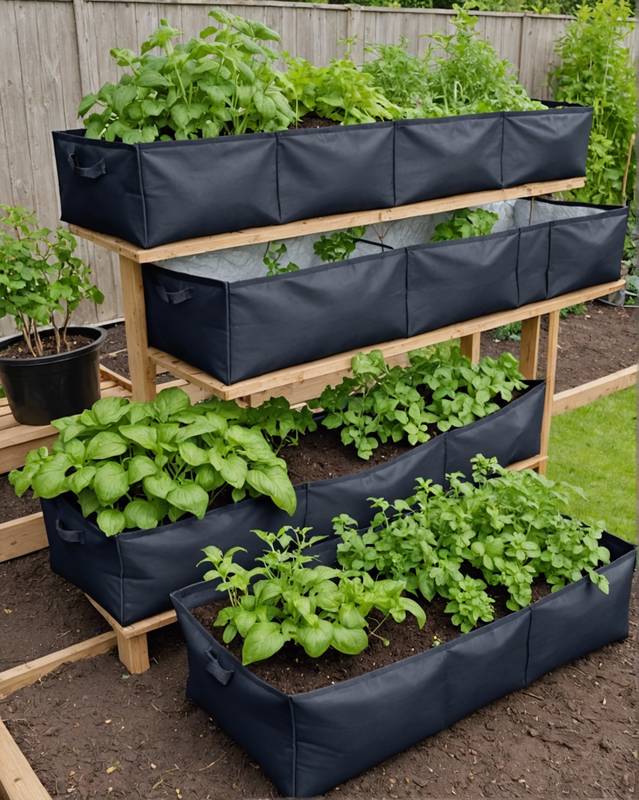
Fabric grow bags offer a budget-friendly alternative to traditional raised beds.
Unlike wooden or metal raised beds, fabric grow bags are typically made from breathable materials like felt or canvas, providing excellent drainage and aeration for plant roots.
These grow bags can be conveniently placed on patios, balconies, or rooftops, making them ideal for urban gardening or small spaces.
They are portable and easy to transport, allowing for flexibility in garden planning.
Additionally, fabric grow bags are generally less expensive than traditional raised beds, contributing to their cost-effectiveness.
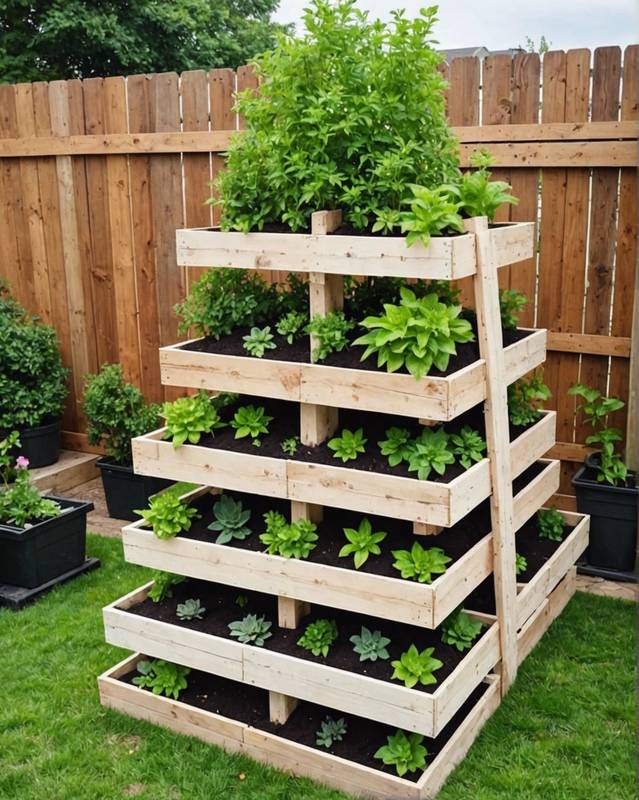
Ingenious and sustainable, the Pallet Pyramid Planter is an exceptional way to maximize growing space and elevate your gardening experience.
Crafted from recycled wooden pallets, this innovative planter features multiple tiers arranged in a pyramid-like structure.
Each tier offers ample space for plants, vegetables, or herbs, allowing you to grow a diverse range of produce in a compact vertical space.
The design ensures optimal sunlight exposure for all plants, promoting thriving growth and bountiful harvests.
Not only is the Pallet Pyramid Planter a practical addition to your garden, but it also adds a touch of rustic charm to your outdoor space.
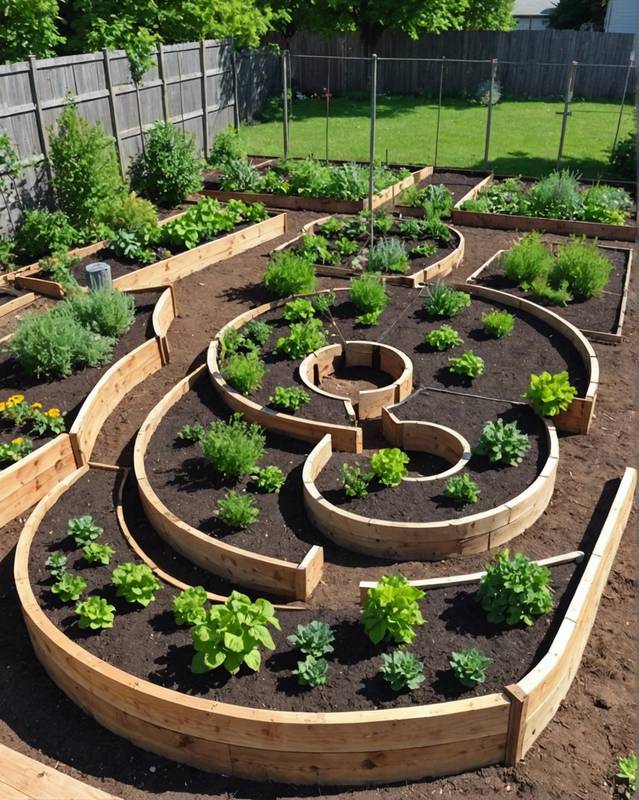
Keyhole gardens combine practicality, productivity, and minimal effort.
Their raised, circular structure with a central access point offers gardeners easy access to every part of the bed, reducing the need for excessive bending or reaching.
This design also facilitates efficient watering and composting, as organic matter placed in the central core composts quickly, providing nutrient-rich water to surrounding plants.
Another key benefit of keyhole gardens is their space-saving design.
By spiraling plants around the center, you can grow more in less space.
This makes them an ideal option for smaller yards or urban gardens.
Additionally, their raised nature aids in drainage and aeration, improving plant health and yields.
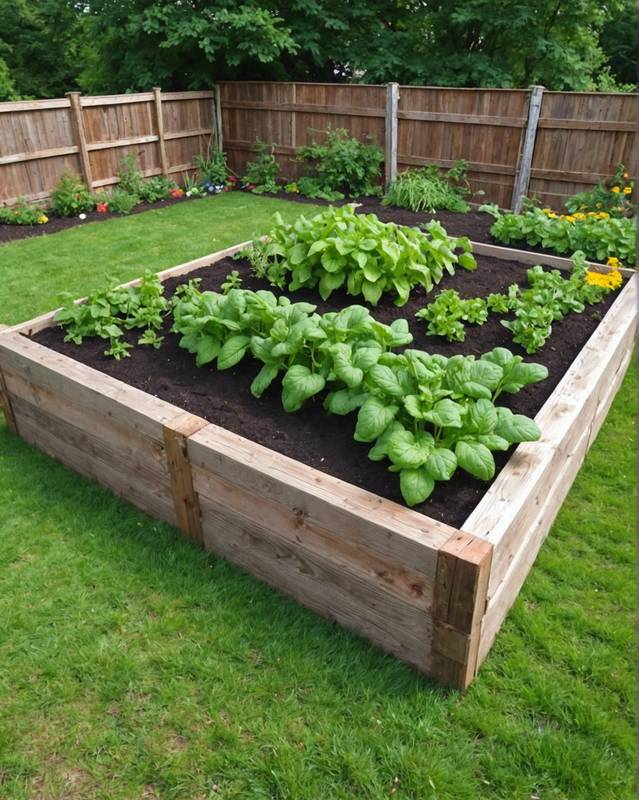
Create a sustainable and fertile raised bed with a Hugelkultur system.
Dig a shallow trench and fill it with logs, branches, biodegradable materials, and compost.
This organic matter decomposes gradually, releasing nutrients into the soil, improving water retention, and aerating the bed.
By building up layers of organic material, you create a rich and self-sustaining ecosystem that promotes plant growth and minimizes maintenance.
Hugelkultur raised beds are an environmentally friendly way to cultivate a thriving garden while enhancing soil health and biodiversity.
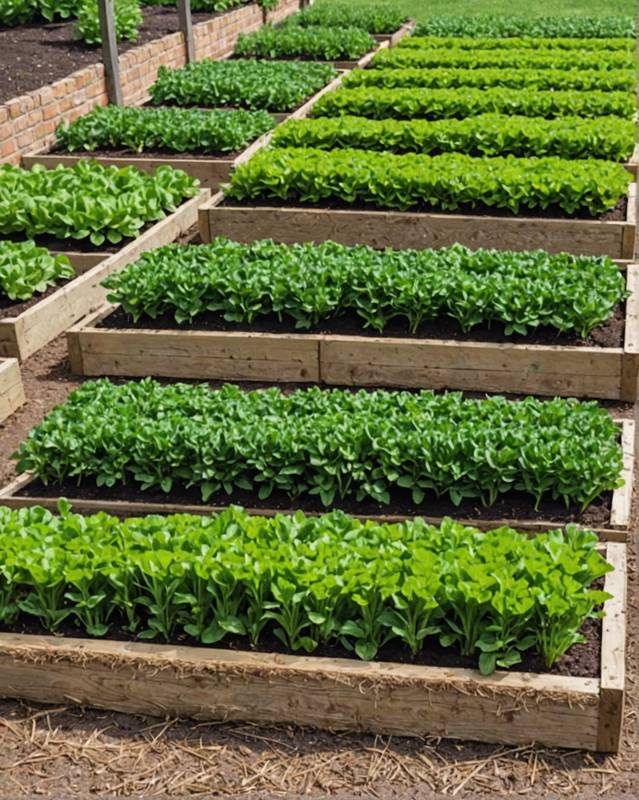
Create a natural-looking and inexpensive raised bed by stacking sod rows. Cut long, thin strips of sod and layer them vertically, overlapping the edges slightly.
Use a wooden stake or rebar to anchor each row in place.
Water the sod regularly to keep it moist and encourage rooting. As the sod decomposes, it will provide nutrients for your plants.
This method is particularly suitable for sloping or uneven terrain.
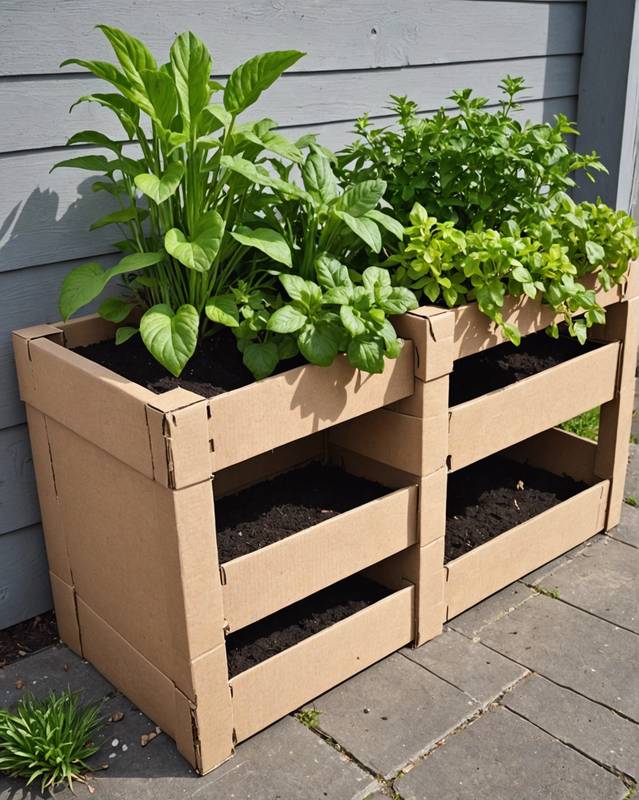
Cardboard boxes are a great way to start a raised garden bed with minimal cost and effort. Cardboard acts as a weed barrier and helps to retain moisture in the soil.
Plus, it’s biodegradable, so it won’t harm the environment.
Simply line the bottom of a cardboard box with cardboard and fill it with soil. You can add plants directly to the box or line it with plastic before planting to prevent the soil from leaking out from the cardboard.
Make sure to remove the tops of the boxes so that water can reach the plants.
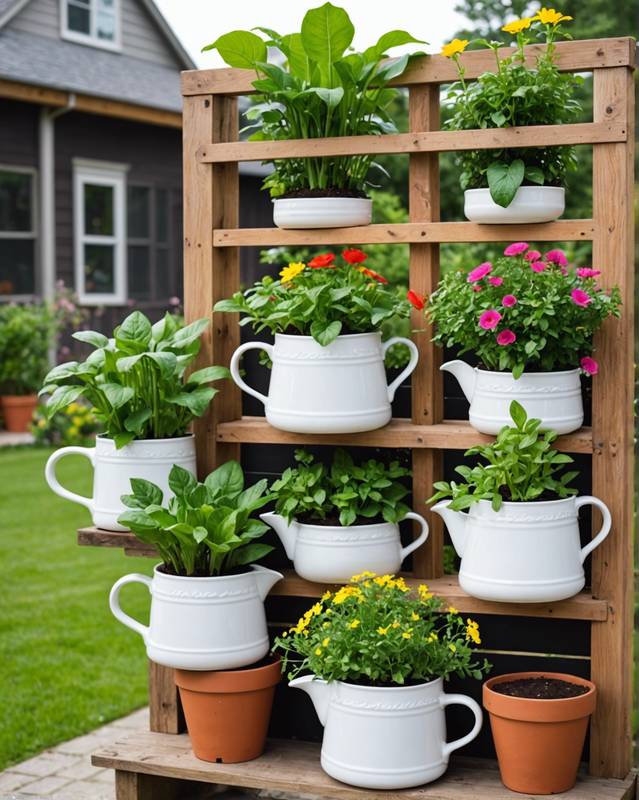
Milk Jug Planter Among the inexpensive options for small raised garden beds is a repurposed milk jug.
This easy DIY project uses a gallon-sized plastic milk jug as the planter.
To prepare, simply cut the jug in half, creating two halves.
Fill the bottom half with potting soil, leaving about an inch of space at the top.
Make drainage holes in the bottom of the jug.
Plant seeds or seedlings in the soil and water thoroughly.
The top half of the jug can be used as a humidity dome to help the plants establish and to protect them from pests.
When the plants are mature enough, remove the top half of the jug.
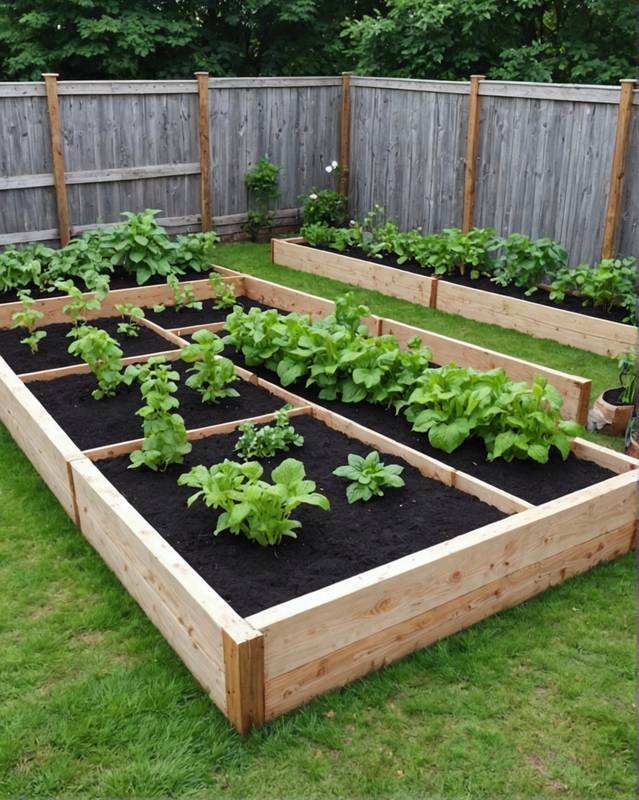
Fabric raised garden beds are a unique and inexpensive way to grow your own food. These beds can be made from any type of sturdy fabric, such as canvas, burlap, or even old bed sheets.
To build a fabric raised garden bed, simply sew or staple the fabric together to create a box shape.
The size and shape of the bed can be customized to fit your needs. Once the bed is built, fill it with soil and compost.
Fabric raised garden beds are easy to move and can be used for both indoor and outdoor gardening.
They are also a great way to grow plants in small spaces.
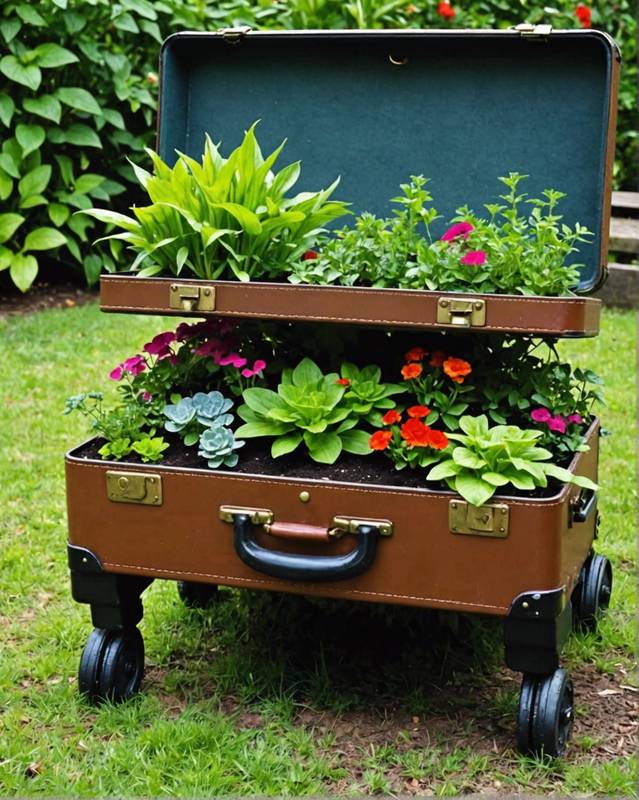
Bring a touch of vintage charm to your garden with repurposed suitcases transformed into unique planters.
With their sturdy construction and weathered patina, suitcases provide excellent drainage and add character to any outdoor space.
Simply drill drainage holes in the bottom, fill with potting mix, and plant your favorite flowers, herbs, or vegetables.
Paint or decorate the suitcases to match your style and create a whimsical addition to your yard or patio.
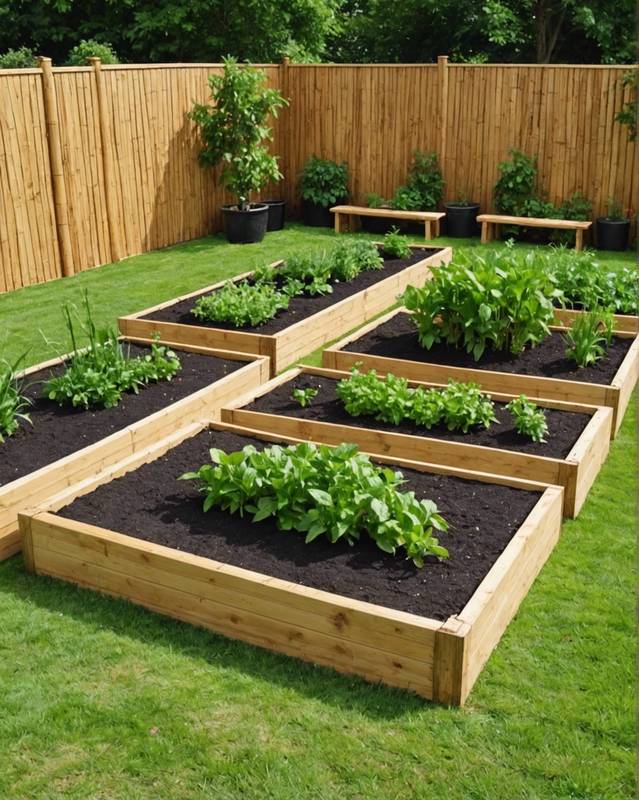
Bamboo Raised Garden Bed is a sustainable and cost-effective way to elevate your gardening experience and grow healthy plants. Bamboo is a highly renewable resource that offers natural resistance to rot and insects.
Its pliable nature allows for easy shaping, creating raised garden beds in various sizes and configurations.
Bamboo raised garden beds provide excellent drainage, preventing waterlogging that can harm roots. Their elevated design improves soil temperatures, promoting vigorous plant growth.
Additionally, bamboo’s natural aesthetic blends seamlessly with any outdoor décor, adding an elegant touch to your garden.
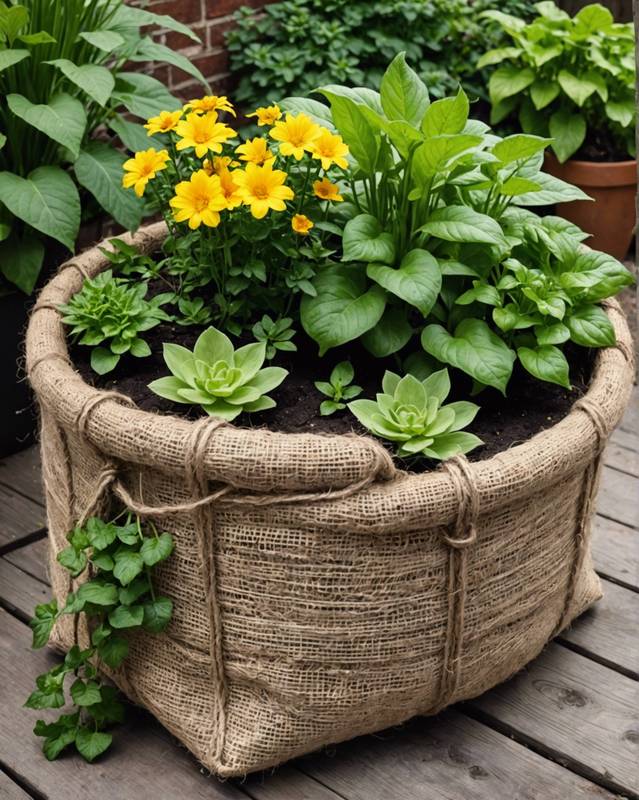
Create a rustic planter using burlap and twine. Line a wooden or plastic container with burlap, securing it with twine.
Fill the container with soil and add your plants.
This planter is perfect for small spaces and adds a touch of natural charm to your home.
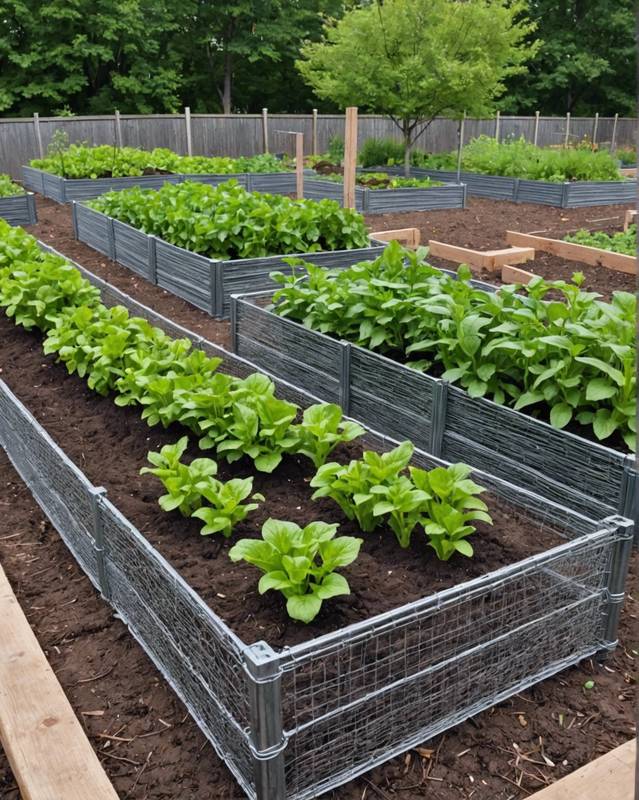
Wire mesh and stakes can be used to secure the raised garden bed and prevent animals from digging into it.
To do this, cut the wire mesh to the desired size and shape, and then secure it to the ground using stakes.
The wire mesh should be buried deep enough into the ground so that it is not easily dislodged.
Alternatively, wire mesh could be used as stakes.
Use wire mesh that is sturdy enough to hold the weight of the raised garden bed and cut it into the desired length.
Push the wire mesh stakes into the ground until they are secure, and then attach the raised garden bed to the stakes.
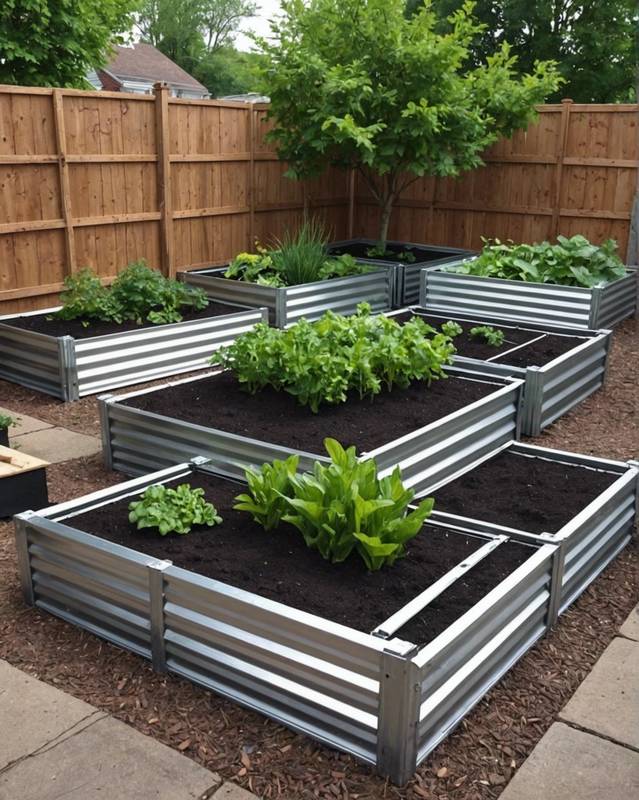
One robust and practical option is a sheet metal raised bed.
These beds are durable and can withstand the elements, making them an excellent choice for areas with harsh winters or strong winds.
Furthermore, sheet metal raised beds provide excellent drainage to prevent waterlogging and discourage diseases in the soil.
To construct a sheet metal raised bed, you will need to cut the sheets to the desired height and length.
Secure the corners firmly with bolts or rivets to create a sturdy structure.
You can customize the size and shape to fit your space and gardening needs, making it a versatile option for various garden layouts.
